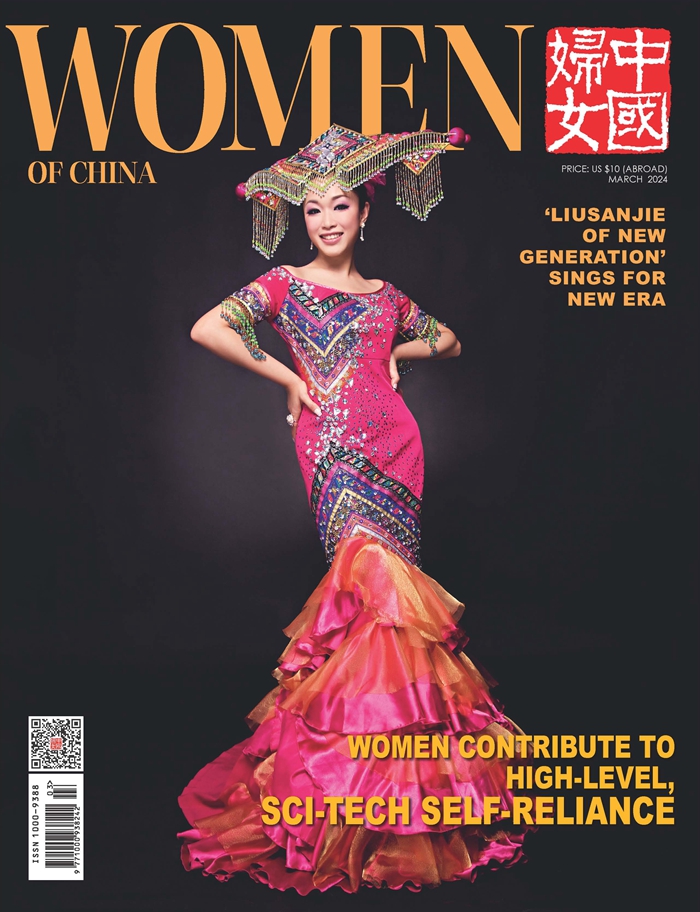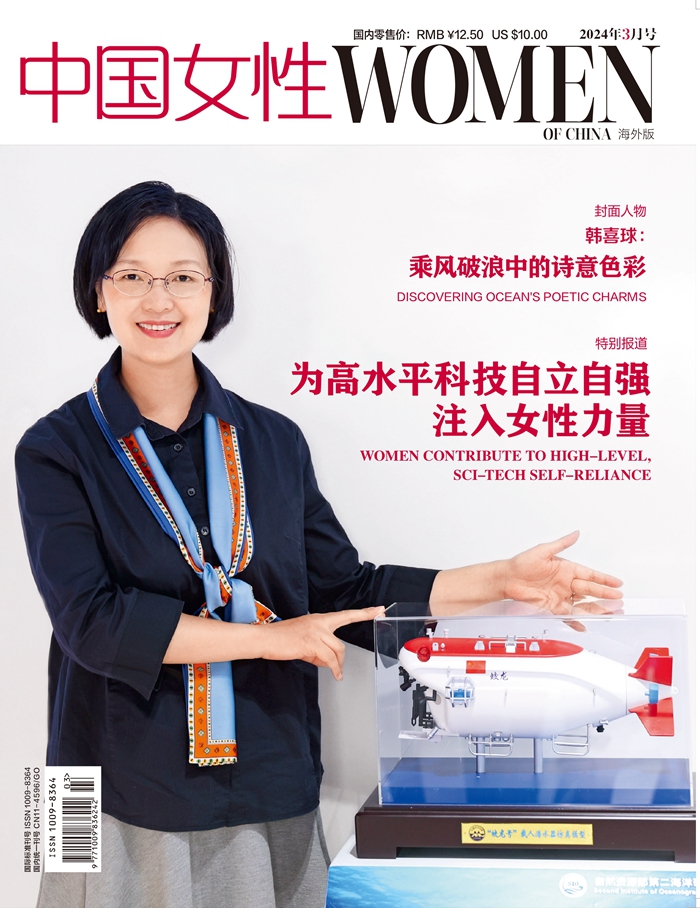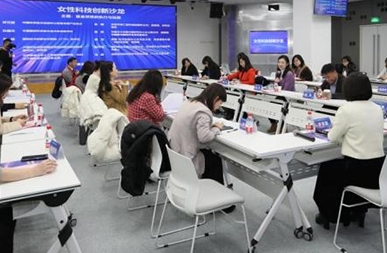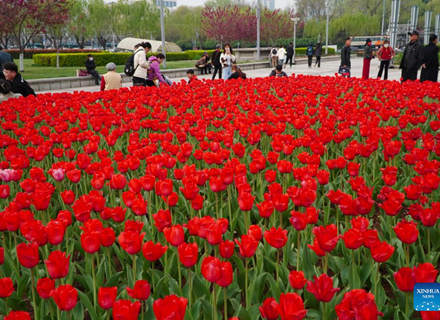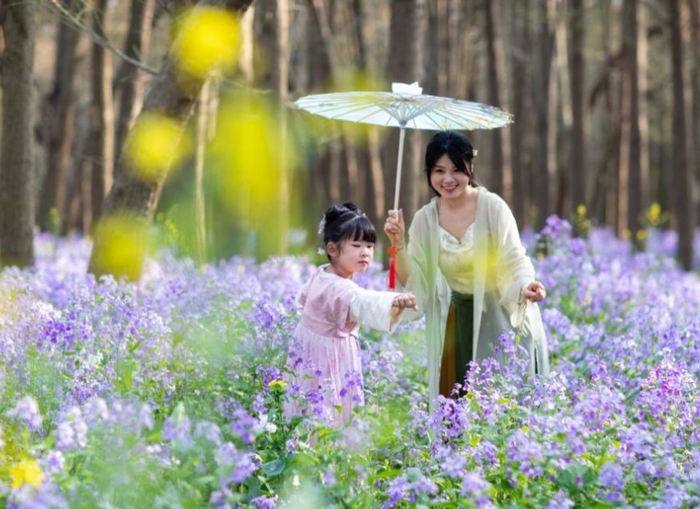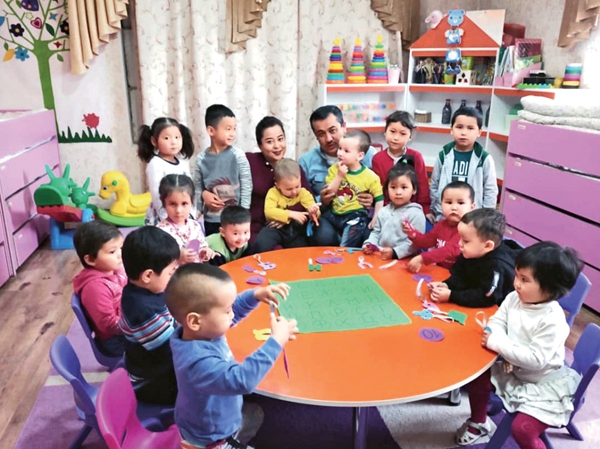 |
| Aynur Tayir and her husband, Xirali Abdukerem, with children |
Ming liang School is popular with Chinese who are living in Bishkek, capital of Kyrgyzstan. Why? At the school, they can both learn the Chinese language and be exposed to Chinese culture. The school was founded in 2016 by Aynur Tayir and her husband, Xirali Abdukerem, both from Northwest China's Xinjiang Uygur Autonomous Region. They have devoted all of their energy to running the school. Thanks to the concerted efforts of the couple, and overseas Chinese who supported the school's development, Mingliang School has become a place where the students can both inherit and promote Chinese culture.
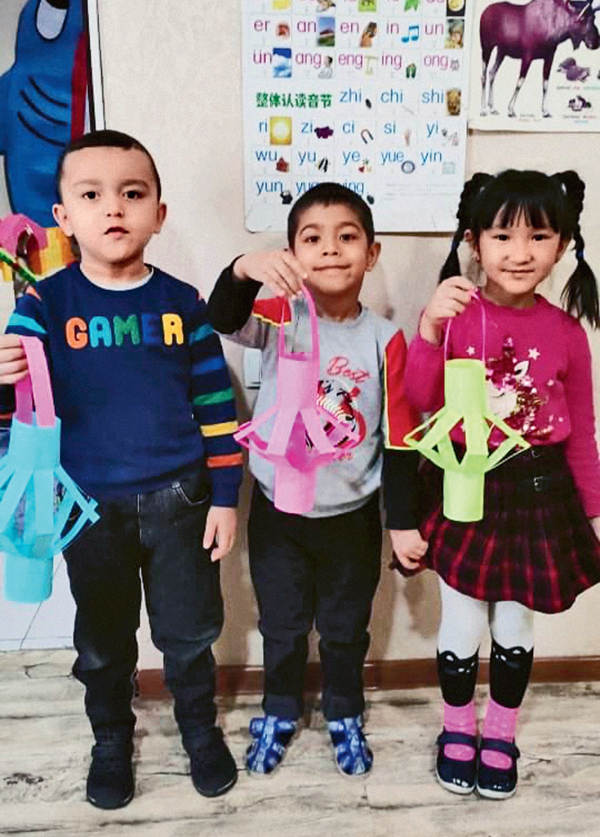
Building a School
Aynur moved to Bishkek in 2007 to pursue further studies. After having lived in Kyrgyzstan for several years, she realized there was an issue that troubled the Chinese community. "Many overseas Chinese were busy with their businesses, and they didn't have enough time to accompany their children, let alone to teach their children the Chinese language. As time passed, the children became unfamiliar with Chinese. Some of them could not even speak a word of Chinese," Aynur says.
There are Chinese-language classes for university students in Kyrgyzstan, but there are few kindergartens and primary schools that offer Chinese-language classes. Preschool children and students from overseas Chinese families face the problem of having nowhere to learn the Chinese language. When the children return to China with their parents, they generally find it difficult to adapt to the Chinese curriculum in primary schools, and some of them even have to study in the lower grades.
After she graduated from the university, with a master's degree in education, Aynur decided to open a full-time school for children of overseas Chinese, where they could systematically learn the Chinese language from an early age.
Aynur's parents, and her husband, have supported her. Xirali helps Aynur manage the school, in addition to running his own business. "Even if we lose money, we will support her in running the school. We'd like to help more children speak, read and write in Chinese," Xirali says.
Shortly after the school was established, in 2016, it enrolled its first group of students, aged between 2 and 14. The 30-plus students were divided into classes, with targeted courses, such as Chinese, Uygur, English, Russian and mathematics. The math class is taught in Chinese.
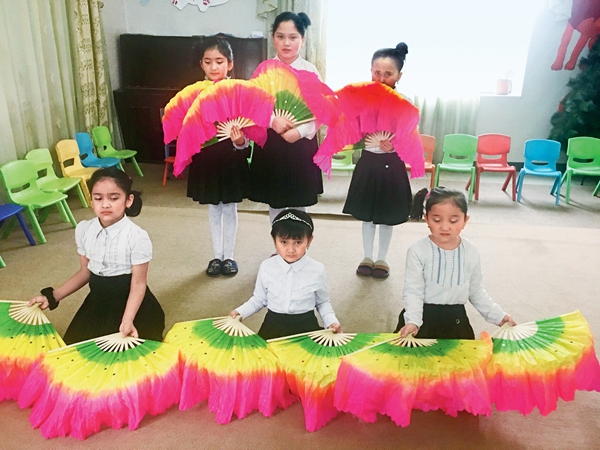
Given that many of the parents ran businesses and spent their days away from home, the school provided meals and the teachers took care of the children during their lunch break.
During the early days of the school, Aynur wore many hats; for example, teacher, cook, and babysitter. Gradually, more people learned about the school, and they sent their children to learn Chinese there. The number of students peaked at 120.
In addition to the Han students, the school enrolled ethnic Uygur, Kyrgyz, Russian, and Uzbek children from overseas Chinese families. The school also enrolled children from local Kyrgyz families. The school has hired several full- and part-time teachers, and dance, chess and physical-education classes have been added to the curriculum.
"Many children didn't speak Chinese at all in the beginning, but they have made remarkable progress in their studies. They always say 'hello' to me in Chinese before class. Some students have contacted me to say they have performed well in primary school after they have returned to China with their parents. I feel happy for them," Aynur says.
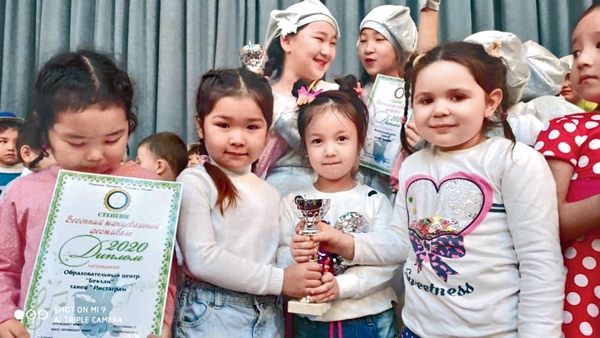
Immersed in Chinese Culture
Ding Wei has been giving Chinese-language lessons to lower-grade students each Monday to Friday afternoon for more than a year. Ding, who has been living in Kyrgyzstan for more than a decade, is always patient with her students.
"I have a 3-year-old child in my class. She was shy and knew little about Chinese in the beginning. I would hug her, and I taught her how to spell Chinese pinyin, and how to read nursery rhymes. Now, she is brave enough to raise her hand and stand up to recite the text aloud. I feel a sense of accomplishment. Every teacher is like the mother of the children. We hope, through our teaching, the Chinese culture will sprout in the hearts of children," Ding says.
In 2021, Aynur organized the school's first Chinese-language summer camp. Children were immersed in Chinese culture during the two-month period. In addition to Chinese, the children also learned Chinese dance, Chinese musical instruments and Chinese calligraphy.
The next year, the school organized the second summer camp. Aynur invited Liena Aishaike, a young, ethnic Kyrgyz woman from Xinjiang, to teach Chinese. Proficient in Chinese, Kyrgyz and Russian, Liena could communicate with children from the different ethnic groups, and she could explain the meaning of Chinese words in multiple languages.
"I was impressed by these smart, and lovely, children. They were curious about the Chinese language, and they hoped to speak fluent Chinese, like their teachers. During the summer camp, we had Chinese class in the morning, every day, and the children all studied very hard," Liena recalls.
"Although the summer camp is short, I hope it can plant a seed of Chinese culture in the hearts of the children, and help them grow up to be ambassadors of China-Kyrgyzstan friendship in the future," Liena adds.
During this year's Spring Festival holiday, the teachers and children made papercuts, and they pasted Spring Festival couplets and the word "fu" at the door of the school office. They also made dumplings.
"What is more worrying than not knowing Chinese is that the children do not understand Chinese culture, and they could lose their identity. We hope to inspire the children's interest in Chinese culture, from an early age, so they will be close to and love China from the heart," Aynur says.
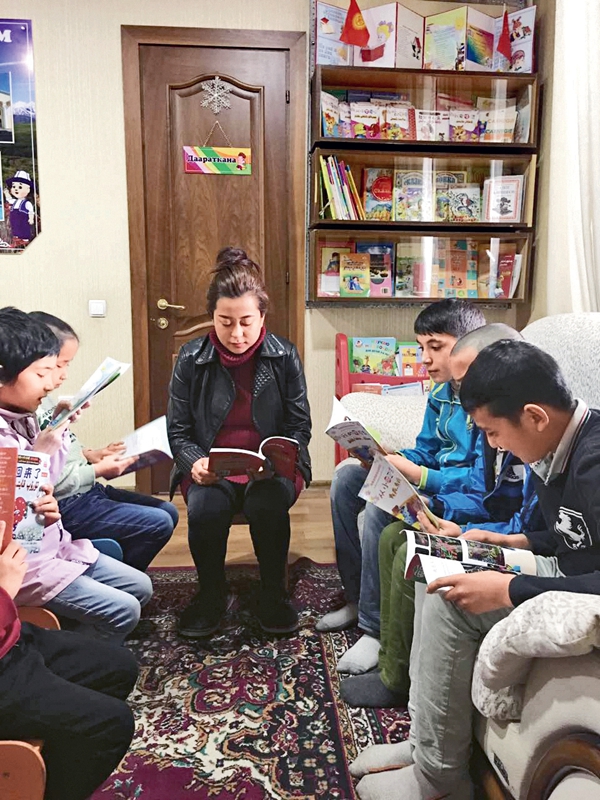
Bright Hope
Aynur has helped cross-cultural families bridge the generation gap and foster stronger family ties. "In Kyrgyzstan, many overseas Chinese marry local people. Growing up in Kyrgyzstan, children of these families are used to speaking the local language. So, there is often a lack of communication and intimacy with the parent whose native language is Chinese. After learning Chinese, some children gradually learn to express their ideas in Chinese, and have heart-to-heart communications with their parents. Every time parents say 'thank you' to me, I feel it was worth it to start this school," Aynur says.
Mingliang School has received great support from overseas Chinese, and from overseas Chinese organizations. Bishkek Overseas Chinese Center has donated toys, books, musical instruments and bunk beds. Yang Caiping, director of the center, still remembers what Aynur said when she introduced the school's philosophy: "Children are in great need of learning Chinese."
"Mingliang School is a private, Chinese-language school founded by our ethnic minority compatriots. Their efforts deserve our support. As a non-profit, public-welfare organization, the mission of our center is to relieve the difficulties of overseas Chinese in Kyrgyzstan. No matter what difficulties the school may encounter, we will do our best to support them," Yang says.
Lin Jindian, president of Kyrgyzstan Central Asia and Fujian General Chamber of Commerce, has cared about and supported the school's development for many years. He has called on overseas Chinese to attach importance to children's Chinese-language learning, and to seize the opportunity for cultural enlightenment.
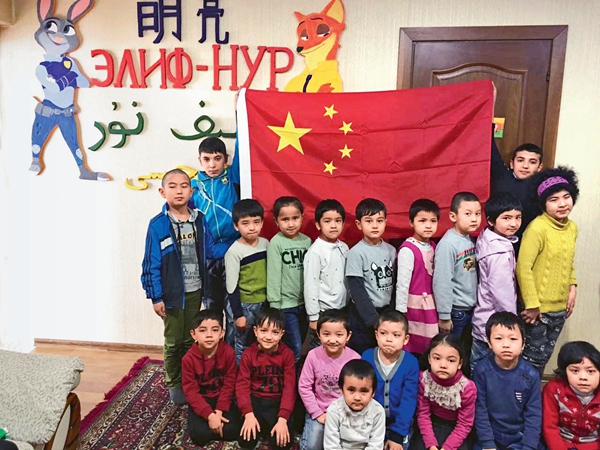
"Living abroad, we expect our children to learn Chinese well, and to remember where they come from. In the future, whether the children go back to China to continue their studies, or grow up to study and work in China, or work overseas on China-related projects, the Chinese language and Chinese culture will be their lifetime wealth," Lin said, during the school's summer camp, last year.
Aynur hopes to recruit more professional teachers, find more suitable textbooks, and improve the quality of the school. "Children are like the rising sun. The name of our school, Mingliang, means bright in Chinese. We want to help the children get off to a good start, learn Chinese well, be fully aware of their identity, and retain the roots of Chinese culture. I believe we will have bright hope as long as we do well, in terms of cultural inheritance," Aynur says.
Photos Supplied by Interviewee
(Source: People's Daily Overseas Edition/Women of China English Monthly March 2023 issue)
32.3KPlease understand that womenofchina.cn,a non-profit, information-communication website, cannot reach every writer before using articles and images. For copyright issues, please contact us by emailing: [email protected]. The articles published and opinions expressed on this website represent the opinions of writers and are not necessarily shared by womenofchina.cn.
